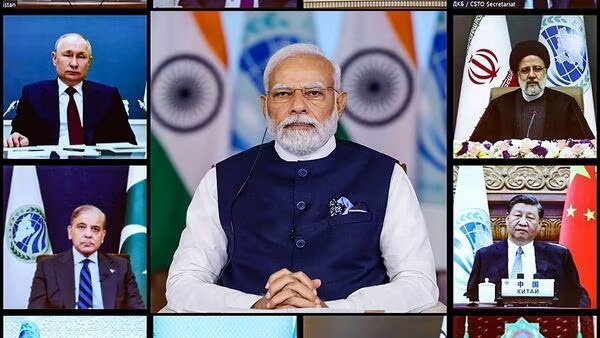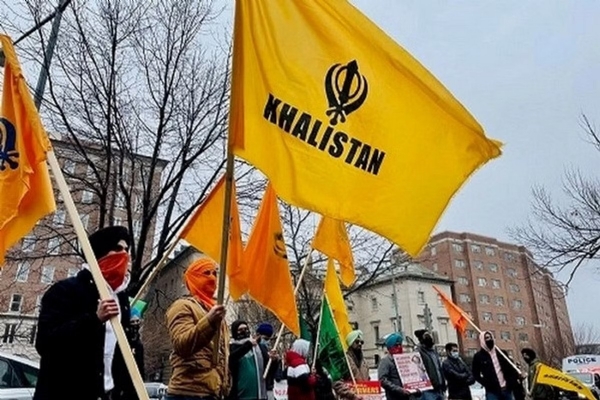#SecurityScan 48: DRDO's Tapas UAV, China-Taiwan conflict & more
The potential development and deployment of neuro weapons or brain weapons by China represent a significant threat to global security and stability.
Total Views |
This article is a summary of important events that have taken place in last one week affecting, India's national security .
Countering Chinese Grey zone War
Chinese Brain warfare with Neuro weapons-
China‘s People’s Liberation Army is developing high-technology weapons designed to disrupt brain functions and influence government leaders or entire populations, according to a report by three open-source intelligence analysts.

The weapons can be used to directly attack or control brains using microwave or other directed energy weapons in handheld guns or larger weapons firing electromagnetic beams, adding that the danger of China‘s brain warfare weapons prior to or during a conflict is no longer theoretical.
“Unknown to many, the Chinese Communist Party (CCP) and its People’s Liberation Army (PLA) have established themselves as world leaders in the development of neurostrike weapons,” according to the 12-page report, “Enumerating, Targeting and Collapsing the Chinese Communist Party’s Neurostrike Program.”
The Three Warfares is intended to be integrated across the entire spectrum of military operations. Functions have also expanded and correspond to the PLA’s increasing range of military missions. Core functions include, but are not limited to:
• Control of public opinion
• Blunting an adversary’s determination
• Transformation of emotion
• Psychological guidance
• Collapse of (an adversary’s) organization
• Psychological defense
The final case study is the Sino-Indian border standoff that remains tense and potentially escalatory following the armed hostilities that occurred in August 2020 in the Galwan Valley. Similar to the ground situation in Taiwan, the PLASSF is unlikely to obtain pro-Beijing partners within India’s leadership that would operate within India to forward Chinese objectives along the disputed border. In addition, Chinese threats to encircle and overwhelm India, such as those that Beijing makes towards Taiwan, are not credible given India’s large landmass, large population, and substantial conventional and unconventional military capabilities.
India is also a resident power in the Indo-Pacific thereby restricting Chinese options to portray India (to both domestic and regional audiences) as a spent, extra-regional power that is on its way out of the region (as China often portrays the United States).
Given the clear limitations on PLASSF psychological operations against India, it is possible that the PLASSF will focus more heavily on coercive Neuro Strike capabilities and precision targeting of India’s critical information technology systems, including the Indian Regional Navigation Satellite Systems (IRNSS). IRNSS provides real-time positioning capabilities within India as well as a 1,500-kilometer radius outside of India. IRNSS does not have the same user base and market centrality as America’s GPS or China’s BeiDou systems. However, its degradation or disablement by the PLASSF would likely cause substantial military and civilian disruption within India itself, although likely temporary given the ‘fallback option’ onto GPS. In addition to the psychological effects that such an action would achieve on its own, it would also potentially signal to India, as well as India’s partners, that the PLASSF has a substantial technological edge in this military domain and that resistance is a high-risk, low-return exercise.
Countering Chinese Brain Weapons
The potential development and deployment of neuro weapons or brain weapons by China represent a significant threat to global security and stability. The world should take proactive steps to counter this potential threat, including increased investment in research, the strengthening of international norms, enhanced international cooperation, and the development of defensive capabilities.
1. Increased investment in research: Governments and academic institutions should invest in research into the potential applications of neuro technology, including the development of countermeasures against potential neuro weapons.
2. Strengthening international norms: The international community should work together to establish norms and guidelines for the responsible use of neuro technology. This could include the development of international treaties and conventions, similar to those that govern the use of chemical and biological weapons.
3. Enhancing international cooperation: Countries should work together to share information and intelligence on potential threats related to neuro technology. This could involve the establishment of international partnerships and the sharing of best practices and expertise.
4. Developing defensive capabilities: Governments and military organizations should develop defensive capabilities to counter potential neuro weapons or brain weapons. This could involve the development of protective gear, countermeasures against neuro stimulators or modulators, and training programs for military personnel.
The development and deployment of neuro weapons or brain weapons by China, would represent a significant threat to global security and stability. These weapons could potentially be used to disrupt brain functions, influence government leaders, or entire populations, with devastating consequences.
The activities related to the development and deployment of neuro weapons or brain weapons are likely to be highly classified and covert, making it challenging for the international community to monitor or counter them effectively. However, there are several steps that can be taken to mitigate the potential threat of neuro weapons.
News In Brief
India, Tanzania finalise five-year roadmap to expand defence collaboration including equipment & tech
Both sides agreed on the roadmap at the second edition of India-Tanzania Joint Defence Cooperation Committee (JDCC) meeting that was held in Arusha (Tanzania) on June 28 and 29.
Rashtriya Raksha University gets approval to set up centre for studying Chinese army
"The head is expected to play a leadership role and oversee the establishment of the study centre that includes research and study on ...," reads the order issued by RRU. Further, the PLA study centre will have a research officer and faculty to undertake analysis on the Chinese Army, deployed along the Line of Actual Control (LAC) on the India-China border.
NIA conducts searches at five locations in Mumbai, Pune
The National Investigation Agency (NIA) is conducting searches at five different locations in Maharashtra's Mumbai and Pune related to a case connected to an Islamic state. Previously, the NIA conducted raids at several places in Bihar, Gujarat, and Uttar Pradesh in connection with a radicalized module called 'Ghazwa-e-Hind' that was operated by Pakistan-based suspects. During the raids, incriminating material and digital devices were seized.
Lt Gen Manoj Katiyar assumes charge as General Officer Commanding-in-Chief, Western Command
An alumnus of the National Defence Academy, Khadakwasla and the Indian Military Academy, Dehradun, Katiyar was commissioned into the 23rd Battalion of the Rajput Regiment in June 1986. He is a graduate of the Defence Service Staff College, National Defence College as well as a distinguished graduate of the National War College, USA.
What DRDO's Tapas UAV is capable of as it readies for user evaluation trials?
The Tapas-201 UAV boasts a versatile design, enabling it to undertake various missions, including intelligence, surveillance, and reconnaissance tasks for all three branches of the Indian armed forces. With an impressive endurance of 24 to 30 hours, the UAV offers an extended operational window for carrying out vital military operations.
Defence exports clock in at 16,000 cr for 2022-23, ten times that of 2016-17
India's defence exports rose to Rs 15,920 crore in 2022-23, an over 10 times increase since 2016-17 when the defence exports stood at Rs 1,521 crore. What policy measures have helped in this rise and what is the road ahead from here. Watch this week's TOI Business Bytes episode.
SCO countries need to counter terror without hesitation: PM Modi

Indian Prime Minister Narendra Modi has called on member states of the Shanghai Cooperation Organisation (SCO) to join together in the fight against terrorism. He added that countries should not hesitate to criticise nations that support terrorism or use cross-border terrorism. Modi also supported enhanced mutual cooperation to prevent the financing of terrorism and urged the grouping to take steps to prevent the spread of radicalisation among young people.
Indian tri-services contingent leaves for French Bastille Day Parade
The Indian Army contingent of 77 marching personnel and 38 members of the Band is being led by Captain Aman Jagtap. Indian Navy contingent is being led by Commander Vrat Baghel and the Indian Air Force contingent by Wing Commander Sudha Reddy. The Rafale fighter jets of the Indian Air Force will also form part of the flypast during the parade.
An Opportunity for India’s Defence Manufacturing Sector
During PM Modi’s visit to the US last week, two major defence deals - co-production of the General Electric F414 fighter jet engine and the acquisition of MQ-9B drones - were announced. The onus is now on India’s defence industrial base ecosystem led by DRDO to transform itself to deliver for India:
There is a compelling case for the DRDO to concentrate its efforts on technologies that will not be readily transferred from foreign sources. This shift requires a major reorientation and restructuring of the DRDO.
As part of the reorientation, the DRDO should shed technologies that can be developed by India’s civil and private sectors, such as special rations and clothing. Once specific technologies are identified, the DRDO must be restructured by creating competing verticals within the organisation, which will obviate the monopoly that verticals enjoy currently because it faces no competition.
Therefore, if there are two verticals for aero-engines instead of one as at present, each of them can team up with different corporate entities to produce the prototype. This will foster a broader research and development base, and stimulate competitive progress in development of key technologies.
US Spies Issue Warnings Over Risks of Doing Business in China
US intelligence officials renewed warnings for American companies doing business in China, citing an update to a counterespionage law that’s due to take effect in the next day.
A bulletin issued by the National Counterintelligence and Security Center on Friday warns executives that an update to China’s counterespionage law, which comes into effect on July 1, has the “potential to create legal risks or uncertainty” for companies doing business in China.
EU leaders agree to ‘de-risk’ the bloc’s trade dealings with China
Issue statement after Brussels meeting that move is to reduce supply chain dependencies, but that EU ‘does not intend to decouple’ from China
The EU also restates its concerns about China’s positions on Russia, Taiwan and human rights.
With Elon Musk’s Starlink, Japan ‘could buy more time’ in conflict over Taiwan
The Japanese Self-Defence Forces have been testing the system, which is now an essential tool for the Ukrainian military,But billionaire Elon Musk might not be keen on it being used for combat with the People’s Liberation Army, analyst Minnie Chan says.
Countering China In Taiwan
US State Department OKs two possible military sales to Taiwan -Pentagon
The U.S. State Department has approved the potential sale of ammunition and logistics support to Taiwan in two separate deals valued at up to $440 million, the Pentagon said on Thursday.
Taiwan has asked to purchase 30mm ammunition, including high-explosive incendiary-tracer rounds, multi-purpose rounds and training rounds, for an estimated cost of $332.2 million, the Pentagon said.
Taiwan says 11 Chinese Fighter aircrafts crossed the Taiwan Strait median line
1. China’s enhanced intelligence-gathering and new military presence in Cuba shows Beijing simply no longer cares what the US thinks. It has long been clear that China and Cuba, among the handful of remaining communist countries, view the U.S. as a common enemy. A fuller picture of their common cause was revealed recently, first by the Journal and then by government disclosure that China is using Cuba for eavesdropping and military training. China has been running extensive spying operations out of Cuba and secretly arming Havana for more than two decades. As far back as 2001, U.S. intelligence was reported to have known the existence of the Chinese eavesdropping operation in Cuba.
2. Hong Kong's pro-democracy online Citizens' Radio station aired its final show on Friday and will cease operations owing to what its founder described as a "dangerous" political situation and the freezing of its bank account by China. A Hong Kong lawyer resisted airbrushing history. Now she is in jail.
Exercising freedom of expression and association — such as by carrying a candle in memory of Tiananmen Square — should not be a crime.
3. As China Reopens Borders, Trafficking of Women and Girls Resumes.
Covid restrictions had mostly halted the smuggling of Vietnamese women for marriage to Chinese men
Before the Covid pandemic, the China-Vietnam border region was a hot spot for human trafficking as many Chinese men sought brides from outside China.
4. China’s Pensions System Is Buckling Under an Aging Population, Beijing has hard choices ahead.
Germany China Relations
5.The German strategy makes clear that Germany cannot do without China. Berlin insists that cooperation should and will continue to be sought on global challenges.
The reality on the ground, meanwhile, further complicates Germany’s China equation. Chinese Premier Li Qiang visited Germany last week, highlighting the importance of the relationship. A preparatory visit to Beijing in May by Jens Plötner, Scholz’s national security adviser, was described by all sides as positive and friendly.
Li’s visit came not long after the decision by Scholz to override concerns by the Federal Foreign Office and allow Chinese involvement in the Hamburg port terminal Tollerort. A less discussed, but perhaps more important, development was COSCO’s withdrawal from the Port of Duisburg in October 2022.
External Security
Why Justin Trudeau appears 'soft' on Khalistani separatists in Canada?
Heading a minority government, Trudeau needs the support of NDP headed by Jagmeet Singh to survive
In the past couple of months, three major anti-India incidents involving Khalistani separatists have been reported in Canada. However, Canadian Prime Minister Justin Trudeau has seemingly not taken any strong action against what is now being called by observers as “new resurgence of Khalistani activism” in his country.
Hoping that his handling of the pandemic will help his Liberal Party win a majority in the House of Commons, Trudeau called for an early election in September 2021. This even though opponents warned that voting amid Covid surge was dangerous.
The results of the 338-member House of Commons were also not to his expectations.His Liberal Party lost 20 seats, lowering its tally to 157 from 177 at the time of dissolution; opposition Conservative won 121 seats, Bloc Quebecois 32, NDP 24, Green Party 3 and one Independent. While Trudeau won more seats than his opponents they were only sufficient to allow him to form a minority government.

According to reports, the Conservatives also got a higher vote share than him. So, not only did he need at least 13 legislators to form the government he also needed additional support to push his agenda.
Headed by Jagmeet Singh ‘Jimmy’ Dhaliwal, the New Democratic Party (NDP) won 24 seats in 2021, making it critical for the survival of the Trudeau government. This may be among the reasons why Trudeau cannot afford to antagonise “somnone who is a known Khalistani supporter”, say observers.
Ever since 2019, Singh also became more vocal in his support of the Khalistani cause.He also targeted the Narendra Modi government during farmers’ agitation over the now-repealed three farm laws.He also drew substantial flak in India when he raised concerns over the Punjab police crackdown against pro-Khalistani activist Amritpal Singh, calling for Trudeau’s intervention.
India has issued 16 look out circulars (LOCs) against pro-Khalistan leaders and activists involved in protests and activities against the country abroad while another three dozen names have been identified to be put under the watchlist before revoking their Overseas Citizen of India (OCI) cards in some cases.
The government has also intensified its efforts to join hands with key countries to deter and counter the growing network of Sikh radicals across the western world.
Ukraine war
Ukraine failing to capitalize on Wagner rebellion
Wagner Group’s aborted mutiny or coup made for dramatic headlines but hasn’t yielded any battlefield gains for Ukraine.
U.S. Advised Ukraine Against Covert Attacks in Russia During Mutiny, Officials Say
Washington asked Kyiv not to do anything that would either try to influence the outcome of events or take immediate advantage of the chaos, according to American officials.
--


